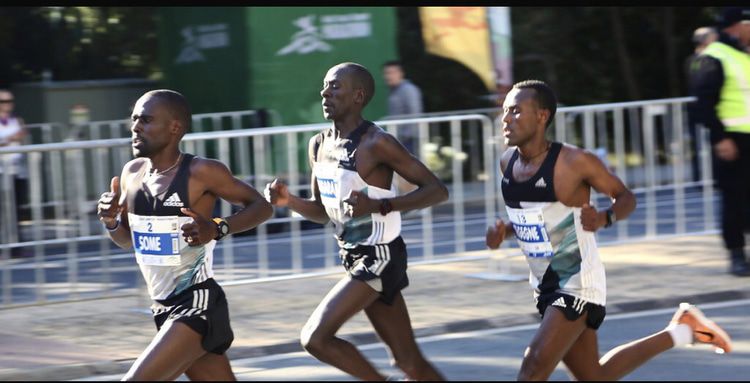
By Steve Sailer
07/26/2019
From Nature:
Sports and IQ: the persistence of race ‘science’ in competition
I don’t actually know what this headline means other than: Angela Saini No Like!
Angela Saini assesses a book examining how bad science lingers.
Angela Saini23 JULY 2019
Kenyan athletes are often subject to debate over their supposed genetic advantage at distance running.
Skin Deep: Journeys in the Divisive Science of Race Gavin Evans OneWorld (2019)
… In Skin Deep, the writer and media lecturer dissects the dubious pseudoscientific arguments still used to justify racism. In my latest book, Superior, I cover similar ground (see R. Nelson Nature 570, 440–441; 2019). Given that Stephen Jay Gould’s critique of biological determinism The Mismeasure of Man was published in 1981 — almost 40 years ago — you might think it’s no longer necessary to reassert that there is no genetic basis for what people think of as race.
Racism in science: the taint that lingers
But today’s political environment reminds us that the concept of deep, unassailable differences between population groups persists. Race ‘science’ — that is, research that looks at the existence and scope of these differences — has to some extent been purged from biology. The vast majority of human genetic variation is today understood to be individual — that is, people from different populations can easily be more similar, genetically, than people from the same population. But the persistence of everyday racism, the perception of regional cultural differences and the use of racial categories such as ‘Caucasian’ in medicine, employment and official data-gathering blind too many to this fact.
Evans zooms in on two focal points of racial stereotypes: sport and intelligence. His section on the success of Kenyan marathon runners in global contests is brilliant: it demolishes the idea of genetic explanations for any region’s sporting achievements. Some have speculated that Kenyans might have, on average, longer, thinner legs than other people, or differences in heart and muscle function. Evans notes, however, that we don’t make such generalizations about white British athletes when they do disproportionately well in global athletics. Such claims for athletic prowess are lazy biological essentialism, heavily doped with racism.
Angela Saini isn’t all that bright, but she’s a very feminine lady, so she knows about as much about sports as I know about soap operas.
The emphasis on Kenyan running is because the sharp differences in performance at different lengths of races solves the methodological problem of distinguishing between ability and desire.
For example, the Japanese dominated sumo wrestling up into the 1980s. But was that because the Japanese are naturally gigantic or was it because they were the only ones who cared about sumo wrestling? (Since then, bigger races have done very well in Japanese sumo, such as Samoans, Mongolians and Bulgarians.)
In running, however, while Kenyans have won Olympic medals at all distances from the marathon down to the 400m and 4x400m relay, they’ve never come close to medaling at 200m or 100m. When I crunched the data in 1997, the Kenyan bell curve was distributed with a high point at 3000 meters (both steeplechase and flat). It’s hard to offer any cultural explanation for why Kenyans would pass up easy money in the short sprints, while dominating in the distances.
On the other hand: Just look at them. While 100m dash Olympians tend to be extremely muscular, the Kenyans who do well in track tend to be extremely slender.
… The politics of our age demand that we counteract ‘scientific’ racism not only with rigour, depth and empathy, but also without fear. Evans takes no prisoners. He skewers the psychologist Steven Pinker, for instance, for entertaining the theories of anthropologists Gregory Cochran, Jason Hardy and the late Henry Harpending, who claim that evolutionary pressures have led to psychological differences between populations. In 2009, at the ‘Preserving Western Civilization’ conference in Baltimore, Maryland, Harpending stated, bizarrely: “I’ve never seen anyone with a hobby in Africa.”
So, obviously, that stereotype must be WRONG! How often does Saturday Night Live make the basis of sketches the cliche that people in Africa seldom have hobbies? Well, that’s just due to the nonstop media indoctrination you are all exposed to about how Africans don’t have hobbies.
Oh, wait … Actually, now that I think about it, that’s not a stereotype at all. The only person I have ever heard making that observation is Henry Harpending, Distinguished Professor of anthropology at the U. of Utah, member of the National Academy of Sciences, Harvard Ph.D., and author of The Structure of an African Pastoralist Community based on his years of fieldwork in Africa.
On the other hand, London journalist Angela Saini points and sputters at Harpending’s observation.
Who are you going to believe about life in Africa: Dr. Harpending or Angela D. Saini? My guess is that Saini knows as much about Africa as she knows about sports.
Or science.
This is a content archive of VDARE.com, which Letitia James forced off of the Internet using lawfare.